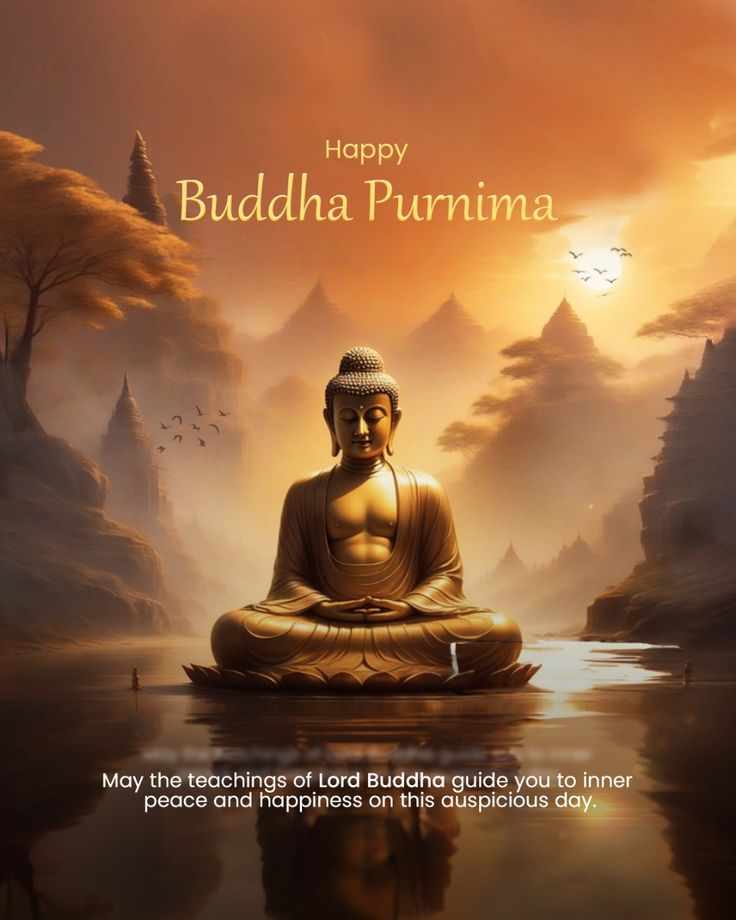🕉️ Introduction: A Day of Peace, Purpose, and Profound Realization
In a world full of noise, desire, and restlessness, Buddha Purnima or Buddha Jayanti invites us to pause, reflect, and realign our inner compass. Celebrated on the full moon of Vaishakha (April–May), it marks the birth, enlightenment, and Mahaparinirvana (death) of Gautama Buddha, the founder of Buddhism.
- 📜 History of Buddha Jayanti: The Triple-Blessed Day
- 📅 Timeline of Important Events Related to Buddha
- 🧠 7 Fascinating Facts About Buddha Purnima
- 🔥 Significance of Buddha Jayanti in Our Lives
- 1. Spiritual Awakening
- 2. Mental Clarity and Emotional Peace
- 3. Universal Brotherhood
- 4. Inspiration for Ethical Living
- 🌍 How Is Buddha Jayanti Observed?
- 💐 Heartfelt Wishing Messages for Buddha Purnima
- ❓ Frequently Asked Questions (FAQs)
- ❓ When is Buddha Jayanti celebrated?
- ❓ Is Buddha Purnima a public holiday?
- ❓ What are the core teachings of Buddha?
- ❓ Why is vegetarianism observed on this day?
- ❓ What is the meaning of Vesak?
- 🧘♂️ Daily Life Impact: Buddha’s Relevance Today
- 📌 Important Takeaways
- 💡 Conclusion: Be the Light in Your World
Whether you’re a spiritual seeker, history lover, or simply someone who values kindness and truth, Buddha Purnima offers universal wisdom for all.
Let us journey through its history, timeline, fascinating facts, customs, societal impact, and the spiritual essence it carries for daily life.
📜 History of Buddha Jayanti: The Triple-Blessed Day
Buddha Jayanti, also known as Vesak (globally) or Buddha Purnima (in India and Nepal), is unique as it celebrates three monumental events:
His Birth – Siddhartha Gautama was born in Lumbini (modern-day Nepal) in 563 BCE.
His Enlightenment (Bodhi) – Under the Bodhi Tree in Bodh Gaya, at age 35.
His Mahaparinirvana – He passed away peacefully in Kushinagar at the age of 80.
These three moments are said to have occurred on the same full moon, making Buddha Purnima spiritually and cosmically aligned for reflection and awakening.
📅 Timeline of Important Events Related to Buddha
| Year (BCE) | Event |
|---|---|
| 563 | Birth of Siddhartha Gautama in Lumbini |
| 534 | Renounces royal life and begins ascetic path |
| 528 | Attains Enlightenment under the Bodhi Tree |
| 528–483 | Teaches the Dharma for 45 years |
| 483 | Enters Mahaparinirvana in Kushinagar |
| 3rd century BCE | Emperor Ashoka spreads Buddhism globally |
| 1950 | World Fellowship of Buddhists officially recognizes Vesak Day |
🧠 7 Fascinating Facts About Buddha Purnima
🌕 Buddha was born, enlightened, and died on a full moon in Vaishakh month.
🏯 Bodh Gaya, Lumbini, and Kushinagar become the most visited Buddhist pilgrimage sites during this time.
🌍 Over 50 countries, including Sri Lanka, Japan, Thailand, Myanmar, and Indonesia, celebrate this day.
🕯️ Devotees light butter lamps, chant sutras, and observe noble silence.
🍚 Dana (charity), especially to monks and the poor, is a vital part of the day.
🐦 No meat is consumed; non-violence (Ahimsa) is strictly followed.
📜 United Nations officially recognizes Vesak as a global observance for peace and humanity.
🔥 Significance of Buddha Jayanti in Our Lives
1. Spiritual Awakening
Buddha’s message of the Middle Path, Four Noble Truths, and Eightfold Path offers tools for inner peace and enlightenment — regardless of religion.
2. Mental Clarity and Emotional Peace
The day inspires self-inquiry, mindfulness, and the cessation of suffering through detachment and compassion.
3. Universal Brotherhood
Buddha’s teachings emphasize equality, tolerance, and non-discrimination, making his message timeless and global.
4. Inspiration for Ethical Living
Whether it’s Right Speech, Right Action, or Right Livelihood, his Eightfold Path offers a moral code that’s deeply relevant to modern life.
🌍 How Is Buddha Jayanti Observed?
In India:
Devotees visit Bodh Gaya, Sarnath, and Kushinagar.
Processions, sermons, group meditation, and recitation of Tripitaka (Buddhist scriptures).
Offerings of flowers, candles, and incense to Buddha statues.
Free food is distributed in monasteries and community centers.
Around the World:
In Sri Lanka, the day is called Vesak and is celebrated with colorful lanterns and alms-giving.
In Japan, it’s called Hanamatsuri and celebrated on April 8.
In Myanmar, people pour scented water over the Bodhi tree.
💐 Heartfelt Wishing Messages for Buddha Purnima
🌸 “May the full moon of Buddha Purnima fill your life with calmness, compassion, and clarity.”
🌼 “On this sacred day, may you walk the path of wisdom, peace, and purpose. Happy Buddha Jayanti!”
🙏 “Let’s honor the Enlightened One by practicing kindness and mindfulness. Happy Vesak!”
🌟 “Awaken the Buddha within you — with love, understanding, and inner silence.”
❓ Frequently Asked Questions (FAQs)
❓ When is Buddha Jayanti celebrated?
It falls on the full moon day (Purnima) in the Hindu month of Vaishakha, typically in April or May.
❓ Is Buddha Purnima a public holiday?
Yes, it is a national holiday in India, Nepal, Sri Lanka, Myanmar, and several Southeast Asian countries.
❓ What are the core teachings of Buddha?
Four Noble Truths:
Life is suffering (Dukkha).
Desire causes suffering.
Cessation of desire ends suffering.
Follow the Eightfold Path to liberation.
❓ Why is vegetarianism observed on this day?
To follow the principle of Ahimsa (non-violence), devotees avoid harming any living beings.
❓ What is the meaning of Vesak?
It is the Sinhalese term used in Sri Lanka and Southeast Asia for Buddha Jayanti, and signifies the month of Vesākha.
🧘♂️ Daily Life Impact: Buddha’s Relevance Today
🧠 Mental Health
His principles of detachment, awareness, and self-discipline help in anxiety reduction and emotional resilience.
👨👩👧👦 Relationships
Practicing Right Speech and Compassion nurtures healthier, more understanding connections.
💼 Work Ethics
Right Livelihood and Mindfulness promote honest work, mindful leadership, and stress reduction in the workplace.
🌿 Environmental Harmony
Buddhism promotes non-violence not just to humans but all life forms, encouraging eco-conscious living.
📌 Important Takeaways
🕊️ Celebrates birth, enlightenment, and death of Gautama Buddha
🪔 Observed with chanting, meditation, charity, and silence
🌎 Celebrated across continents with varied traditions
🧘 Offers practical spiritual tools for daily peace
💬 Encourages ethical living, mindfulness, and universal love
💡 Conclusion: Be the Light in Your World
In times filled with conflict, consumerism, and chaos, Buddha Jayanti reminds us of the power of stillness, simplicity, and self-awareness. It’s not just a religious celebration; it’s a global invitation to choose compassion over cruelty, wisdom over impulse, and peace over ego.
As the moon shines in full brilliance this Buddha Purnima, may your heart glow with calm awareness, your actions reflect selfless love, and your journey align with truth and tranquility.
✨ Final Thought:
“Thousands of candles can be lit from a single candle, and the life of the candle will not be shortened.”
— Gautama Buddha
Let your light shine — today and always.









I think this is among the most significant info for me. And i’m glad reading your article. But should remark on few general things, The website style is great, the articles is really great : D. Good job, cheers